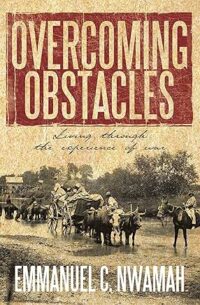Title: Overcoming Obstacles: Living Through The Experience of War
Author: Emmanuel C. Nwamah
Publisher: AuthorHouse
ISBN: 978-1452062914
Pages: 119
Genre: Biographies & Memoirs / Non-fiction
Reviewer: Anthony Avina
Hollywood Book Reviews
For many people, they are lucky to be born into a situation in which they have two loving parents who guide them from the day they are born to the day they become an adult, giving them everything they need to learn and grow into the adults they are meant to become. Yet the reality is this is not the case for everyone, and for some the concept of a “normal” childhood is a far-flung dream, one that is sadly shattered by the grim reality they must face.
It is that struggle and the challenge of overcoming it that drives author Emmanuel C. Nwamah’s Overcoming Obstacles: Living Through The Experience of War.The book is a personal look at what happens when a young child must grow up without both parents, and what happens when they are forced to abandon their childhood amid a growing war and learn to survive the brutalities that await them. It is a story of hope in the face of adversity, and how to hold onto that hope no matter how bleak the future may seem.
The author’s writing style immediately stood out to the reader, embodying the conversational style that instantly draws readers into non-fiction books. The heart and passion which went into the retelling of these powerful memories and events is felt in every chapter, and the fast pacing of that storytelling mimicked the realities of how fast life can go when faced with such hardships and struggles. Each memory and experience the author faced brought the realities of life in Nigeria during a time of civil war to life so vividly; while also showcasing the more personal impact it had on individuals caught in the crossfire of that war.
In any non-fiction memoir or biography such as this, the reader is looking for tales of personal struggle, experiences that they can either relate to or learn from, and experience new paths or walks of life for themselves, and this book does just that. Also, the book offers such unique insight into the culture and history of Nigeria and the people who lived there, and the realities of those who had to live through the civil war. The horrors and atrocities so many faced during that time were horrendous, and yet the author’s hopeful approach to the future was refreshing, as was the insight into how many people were forced into the conflict without asking to become any part of it. Through the eyes of a survivor, the devastation of war becomes deeply personal—yet so does the journey toward peace. With honesty and clarity, Nwamah invites readers into a world shaped by trauma but not defined by it.

